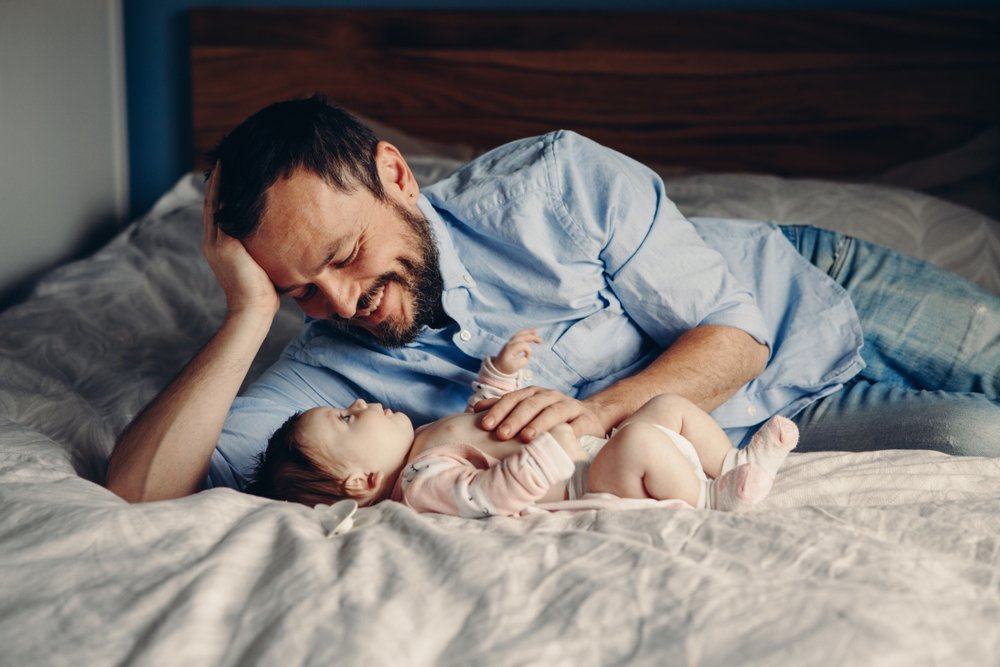Key points:
1. Speech development strategies:
0 to 12 months: Narrate daily activities, make interactions fun, give praise.
8 to 14 months: Choose a topic, have “yes or no” conversations, make a mystery jar.
2. Speak slowly, repeat words, listen, and respond positively to the baby’s communication efforts. Incorporate music and use names instead of pronouns for effective communication.
Usually, a baby starts talking or produces their first words around 10 to 14 months of age. But it’s never too early to start encouraging your baby’s speech development. Children learn how to speak one step at a time, but they need a lot of help from their caregivers!
Language production doesn’t happen overnight. Go from a baby babbling to a baby talking with these activities.
How to get your baby talking
0 to 12 months:
- Be your own narrator: As you change diapers, cook, play, etc. talk to your baby about what you’re doing out loud. Pretend to be a reporter, Olympic Games announcer… Really whatever you need to do to have fun with this.
- Make it fun: Play Peek-a-boo and other games that involve serve-and-return interactions. Even if this doesn’t feel like communication, it is. You’re helping your child understand the relationship between actions and responses. Read more about the benefits of serve-and-return here.
- Give lots of praise: Clapping, smiling, and celebrating your baby’s communication efforts provides positive reinforcement and reminds them that they’re on the right track.
8 to 14 months:
- Pick a topic: A great way to build your child’s vocabulary and get your baby talking is to talk about one particular idea. For example, if you recently visited a pumpkin patch, you could initiate a conversation about farms, farm animals, and vegetables. Your child will likely have a short attention span, so consider incorporating visual aids like pictures or videos to keep the conversation going.
- Have “yes or no” conversations: To build language comprehension skills, ask your child a series of yes or no questions. Your toddler will need to process what you’re saying in order to answer. Keeping the answer simple with a “yes” or a “no” will allow your child to focus on understanding what’s being said without having to produce wordy responses.
- Make a mystery jar: Give your child the reins and let them drive the conversation. Write down ideas on slips of paper, put them in a jar, and pick one or two to discuss at dinner or during downtime. The more aligned the topic is with your child’s interests, the better.
How to get your baby talking at any age:
- General guidelines: Speak slowly and enunciate every word.
- Repeat everything: As boring as it may seem, babies need to hear the same words and phrases repeated again and again in order to process their meaning and pronunciation. For example, “Did you like your ice cream? I liked my ice cream.”
- Listen and respond: Your baby might be “talking” nonsense, but even incomplete or incoherent words are a form of communication. Whenever your baby coos or makes an attempt to communicate, be sure to respond with positive feedback, a smile, or a “good job.”
- Consider using music: Listening to a song is a great way for babies to learn new words, especially if those songs repeat the same word over and over again.
- Use names instead of pronouns: Babies need help linking names to objects. For example, when referring to a father’s actions say “Daddy is drinking coffee” versus “He is drinking coffee.” Similarly, try and say “Do you like the banana?” versus “Do you like it?”
- Not sure about “baby talk?”: Read more about the benefits of infant-directed speech.
Sofia Martinez is a psychologist with a specialty in Early Childhood Development. She’s a certified yoga and meditation instructor, eager to share these techniques with kids and parents. Sofia has spent time working with kids and studying normal development as well as working with kids with special needs, understanding individuality in development. She wants to keep studying ECD and help scale Kinedu’s model to families across the globe.









5 Responses
Thanks for the information 👍
Good info!
Hi! Thanks so much for your comment, we are very glad you are enjoying our content. If you need anything else, please don’t hesitate to contact us at hello@kinedu.com
That’s interesting!
Hi Leenna! Thanks for your comment =)